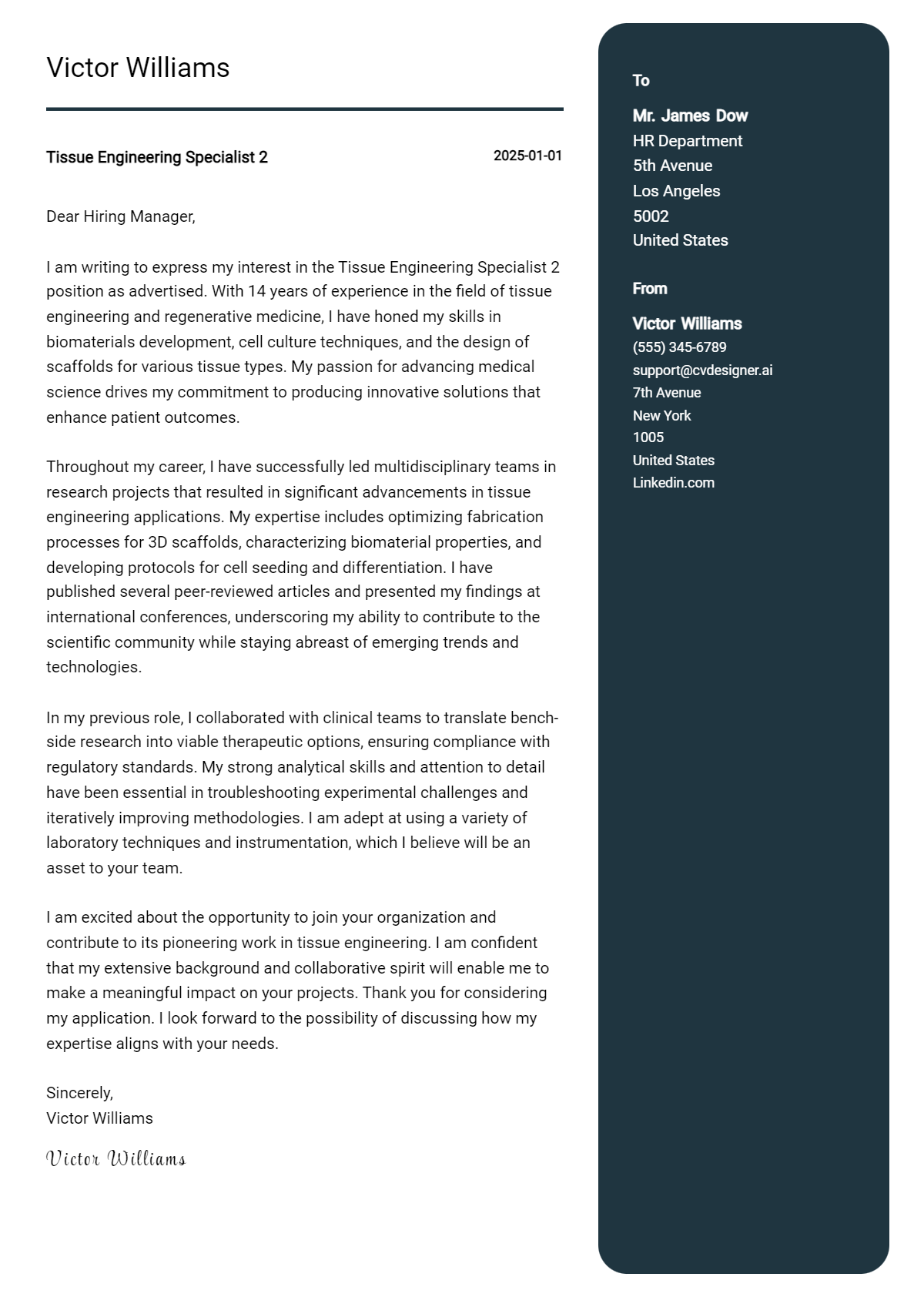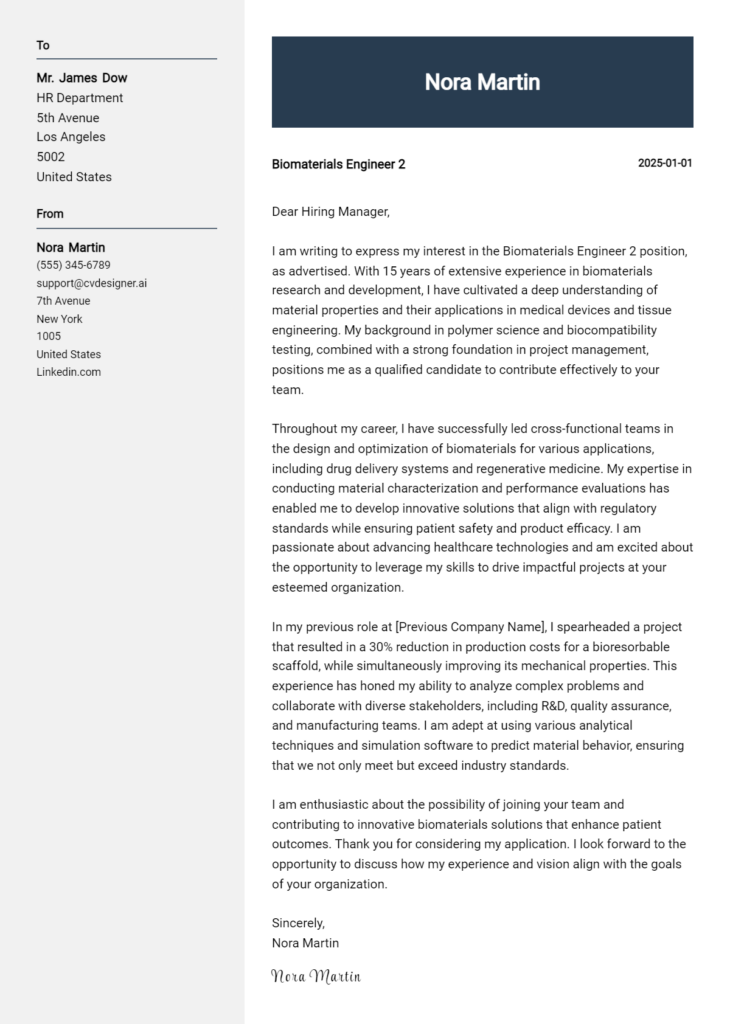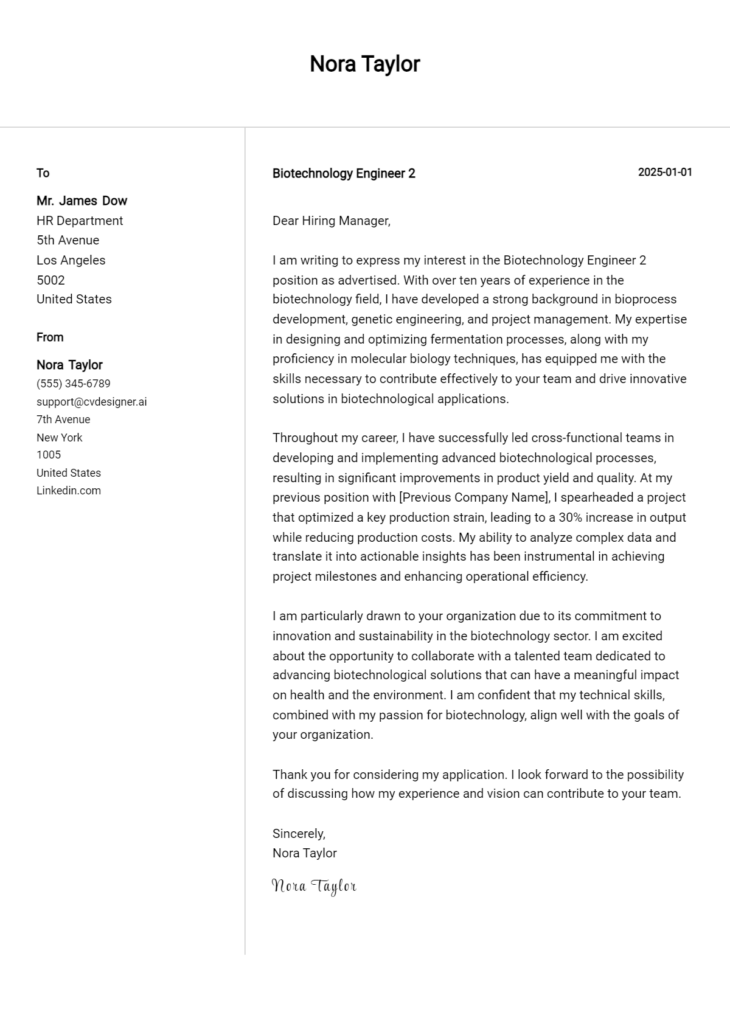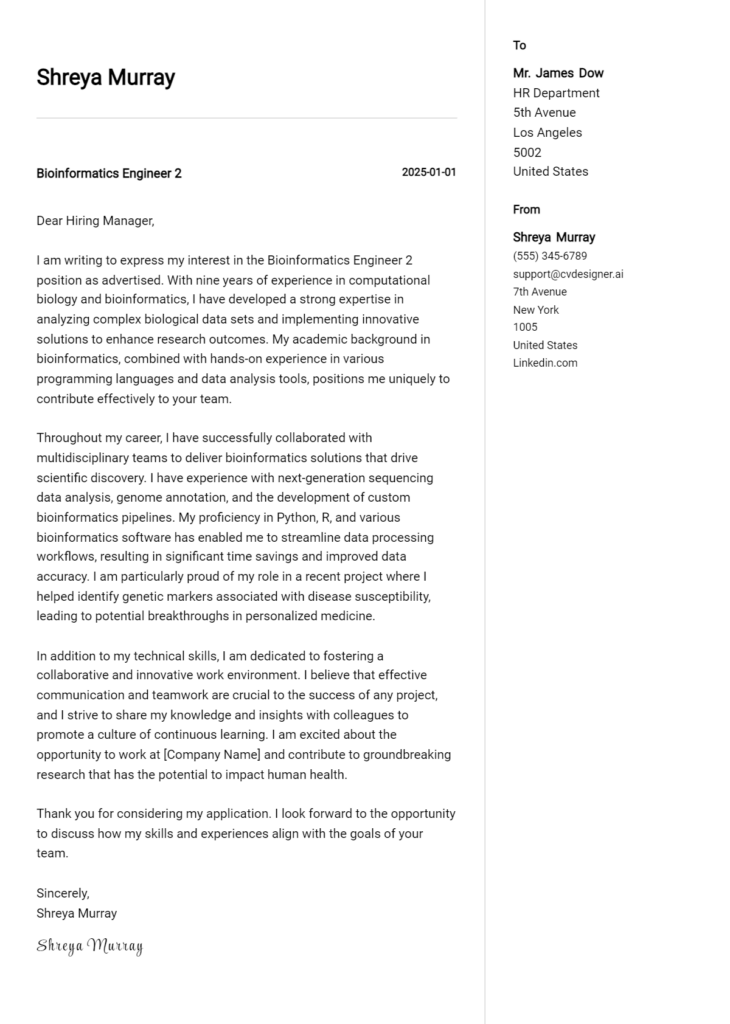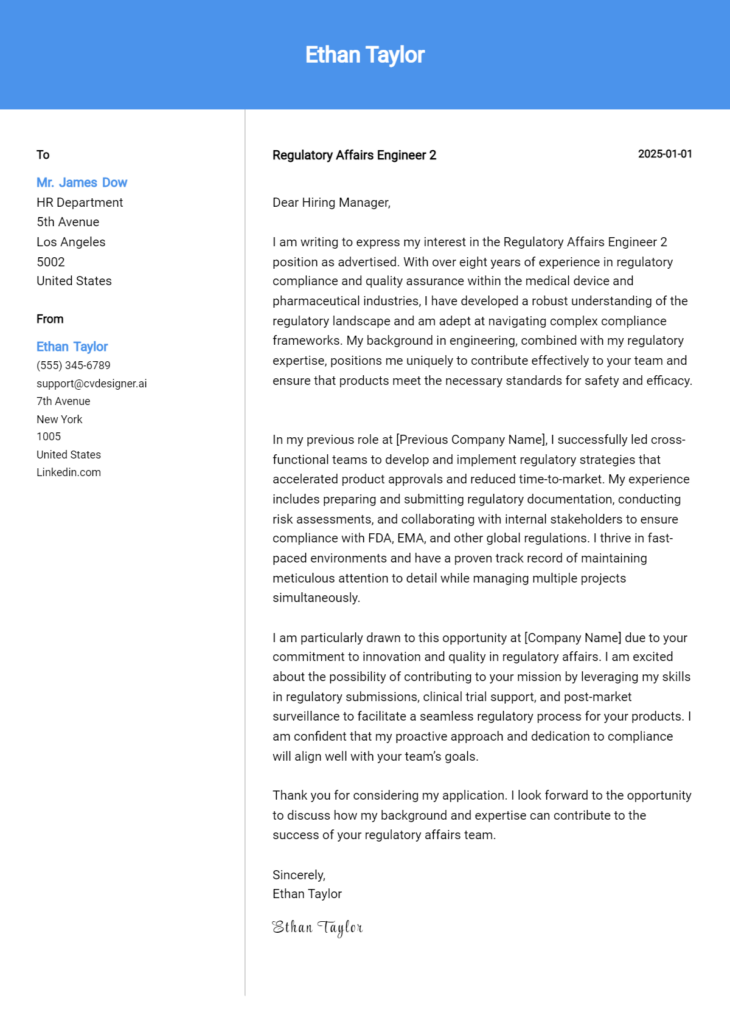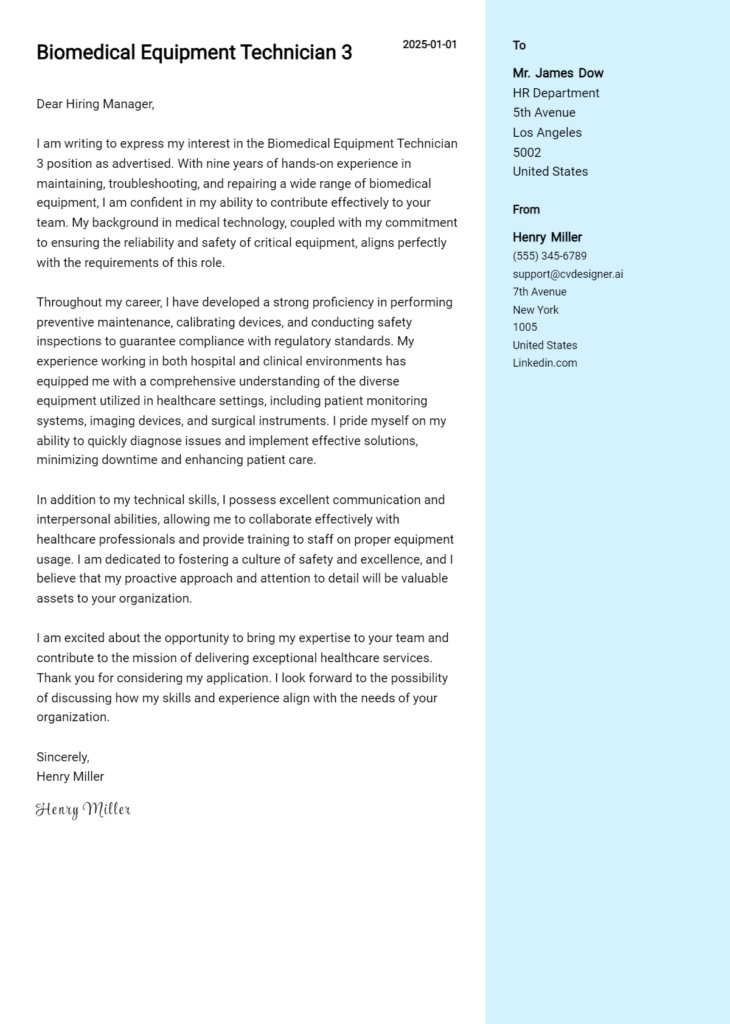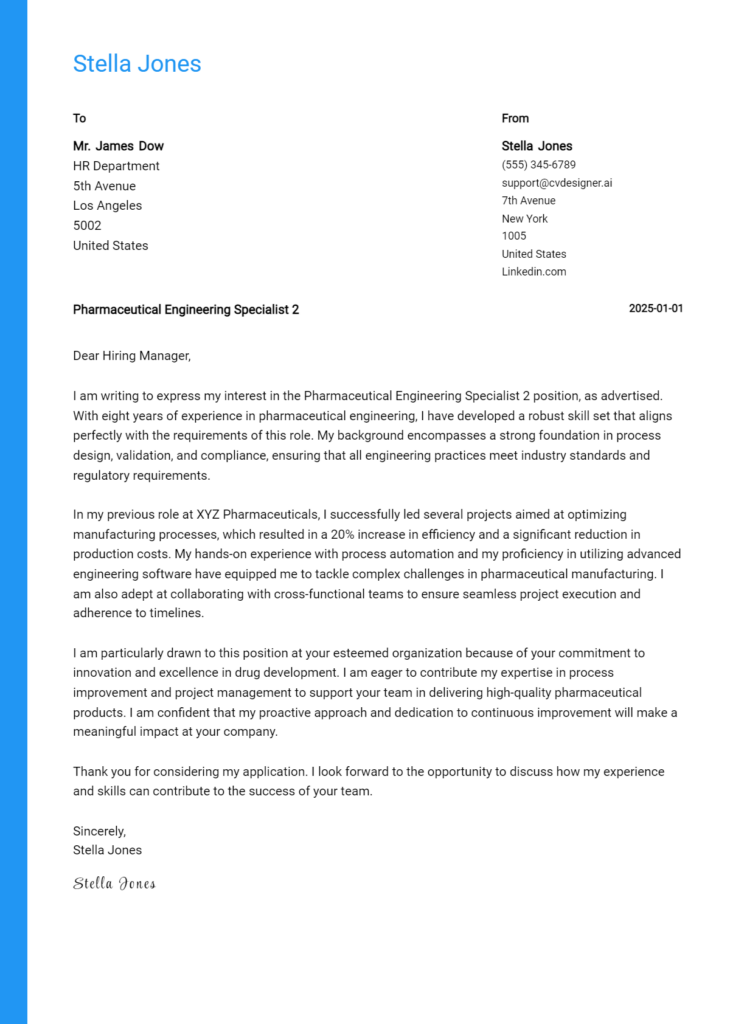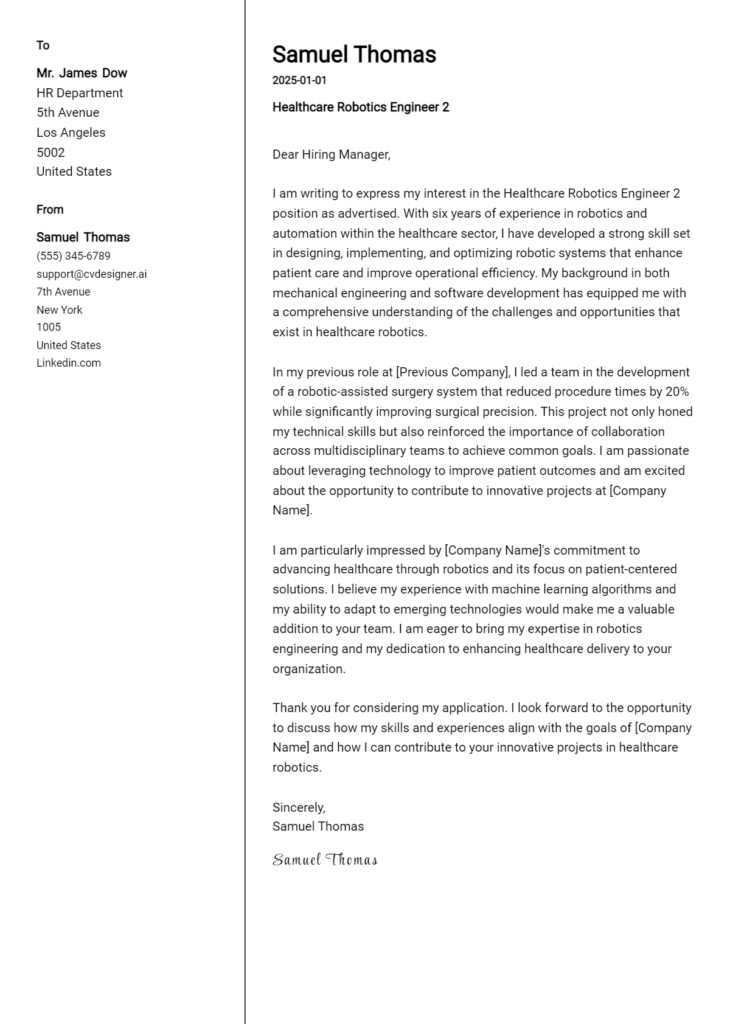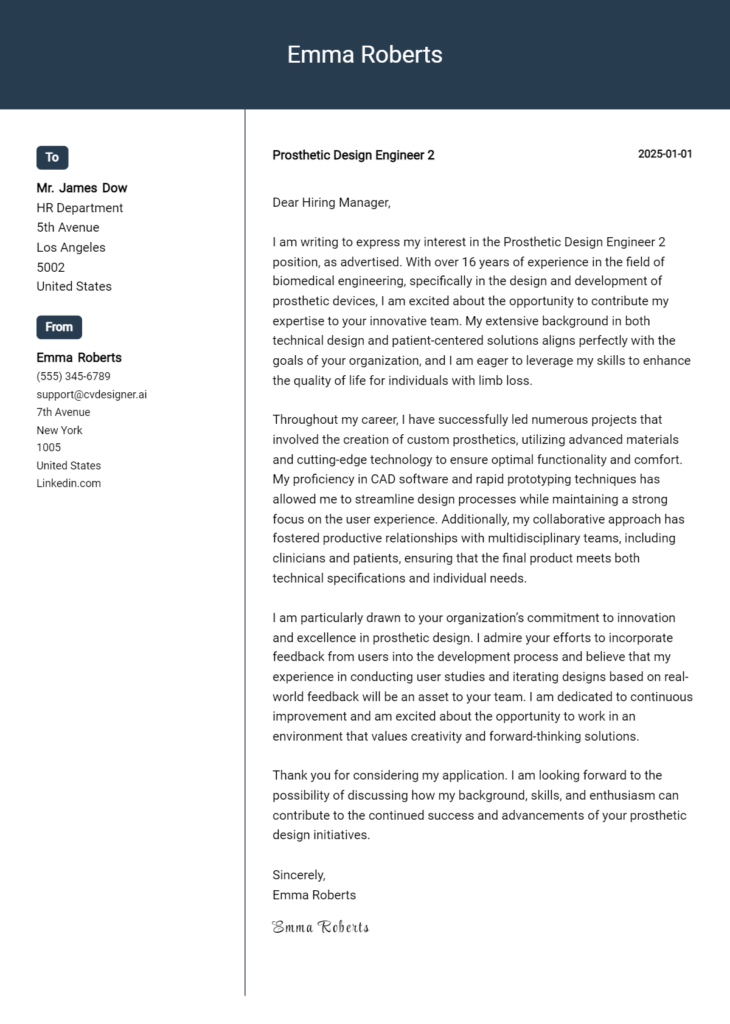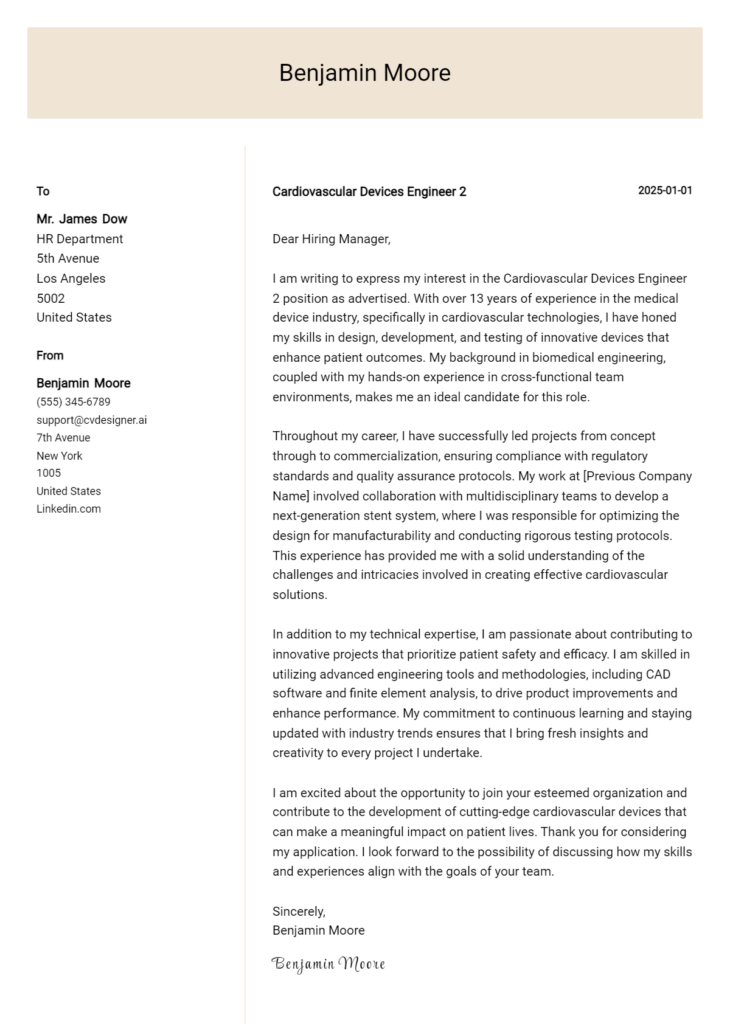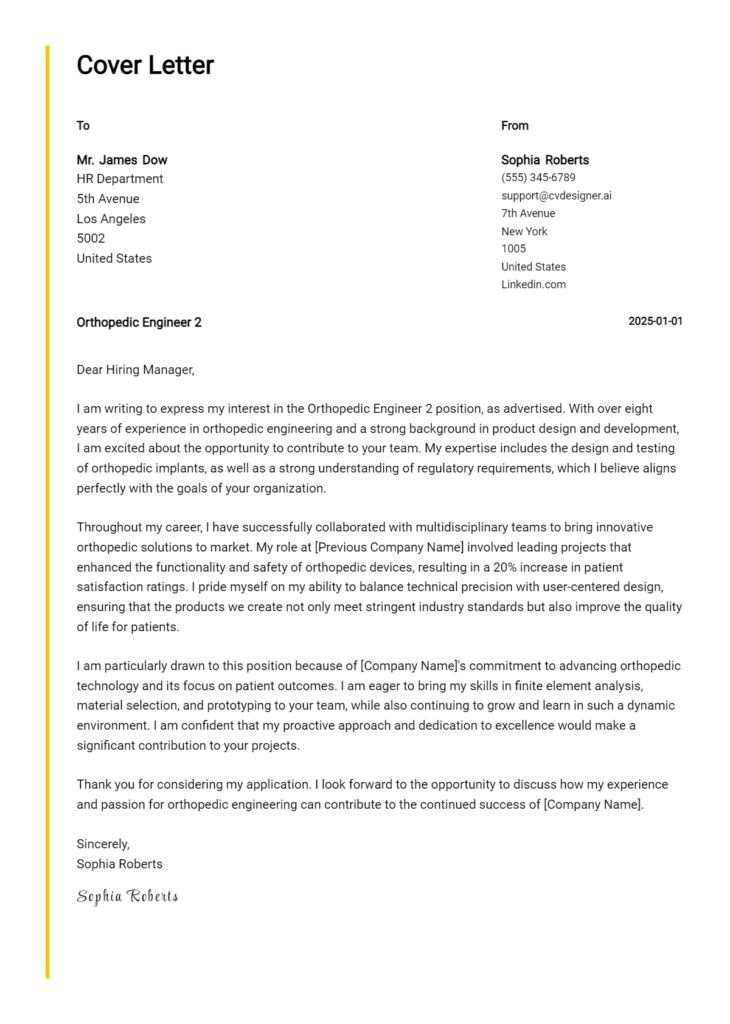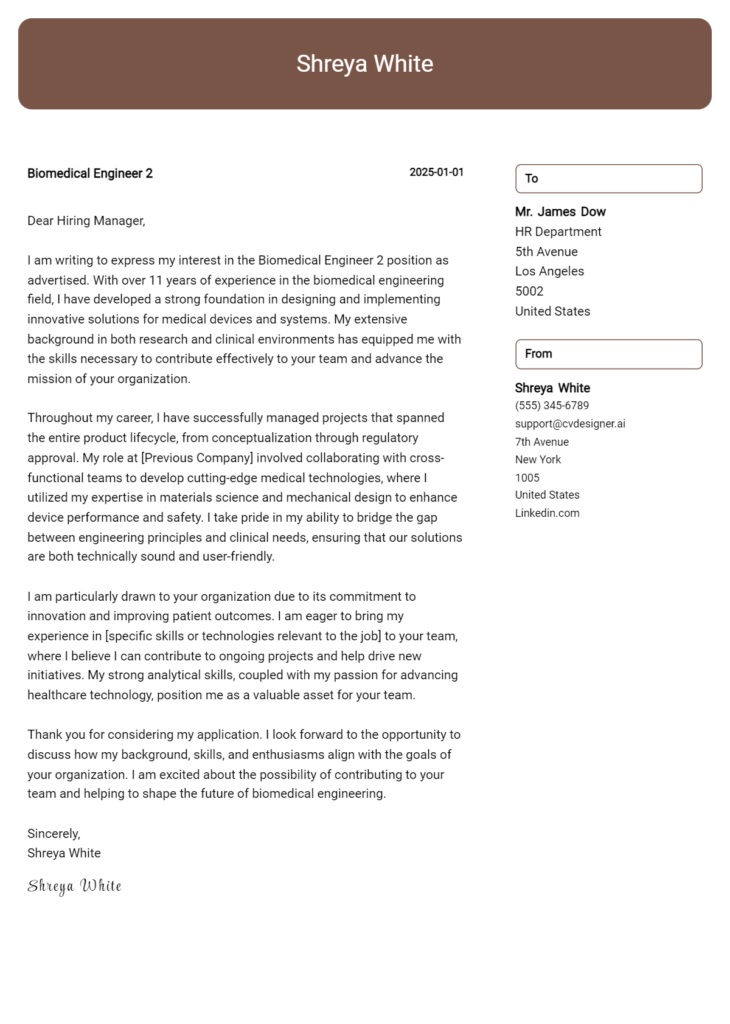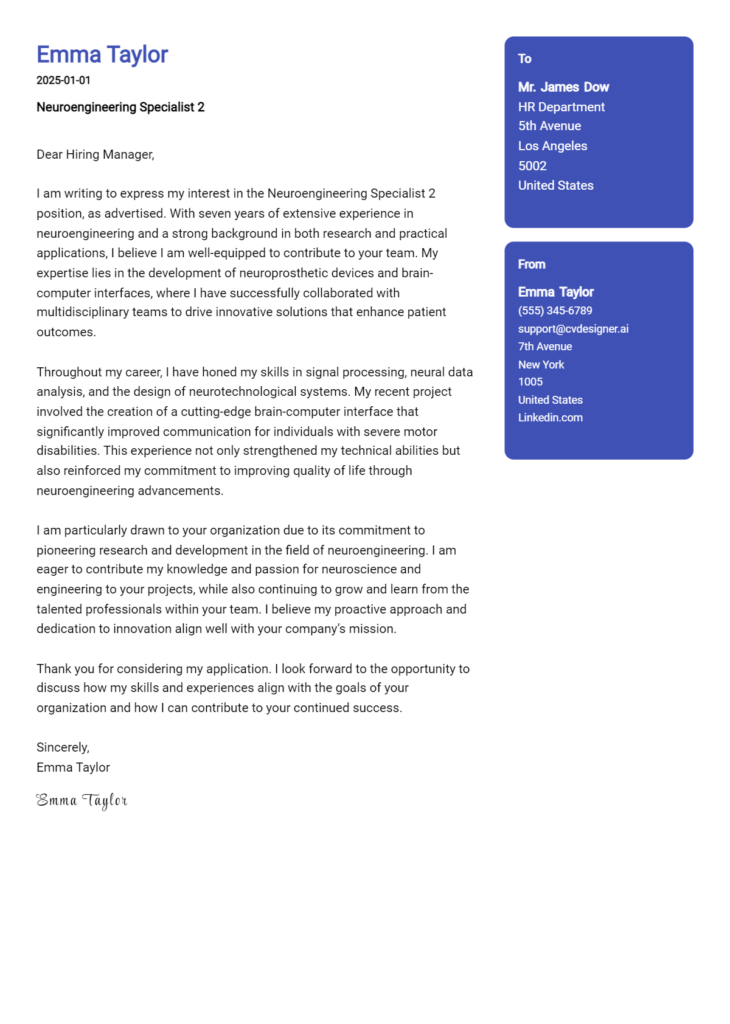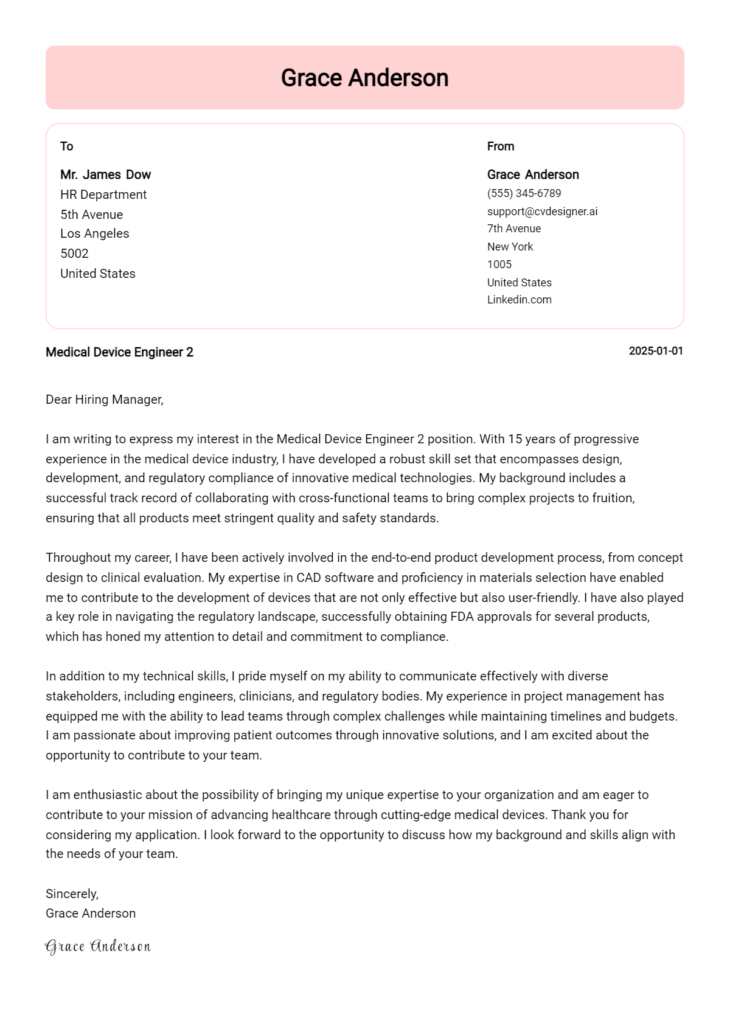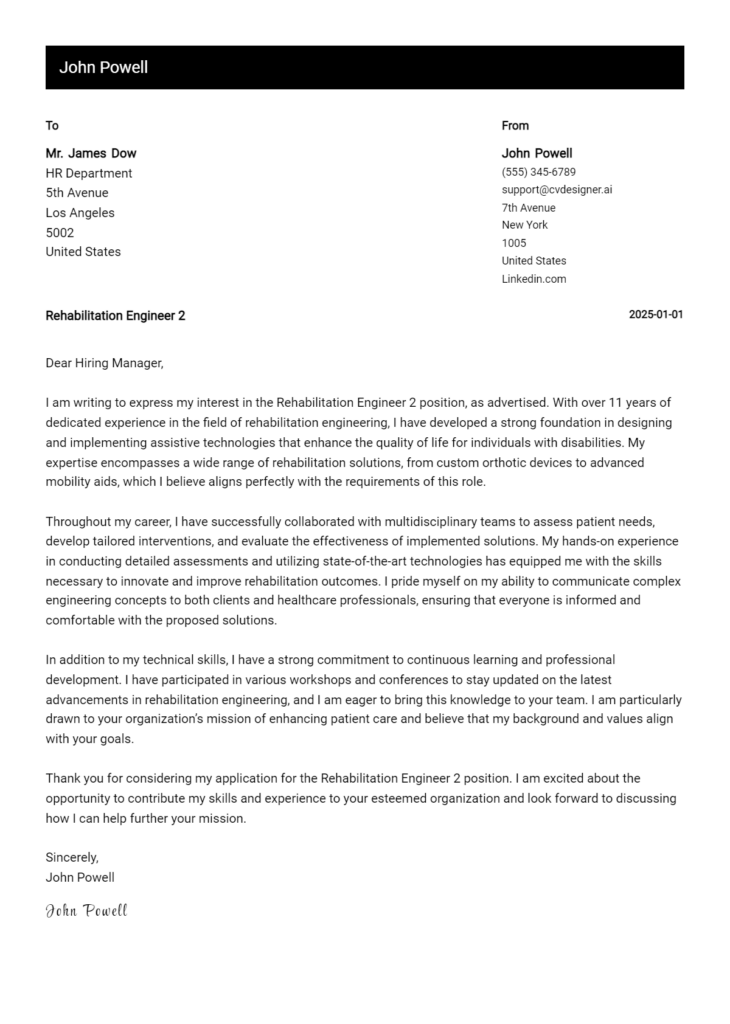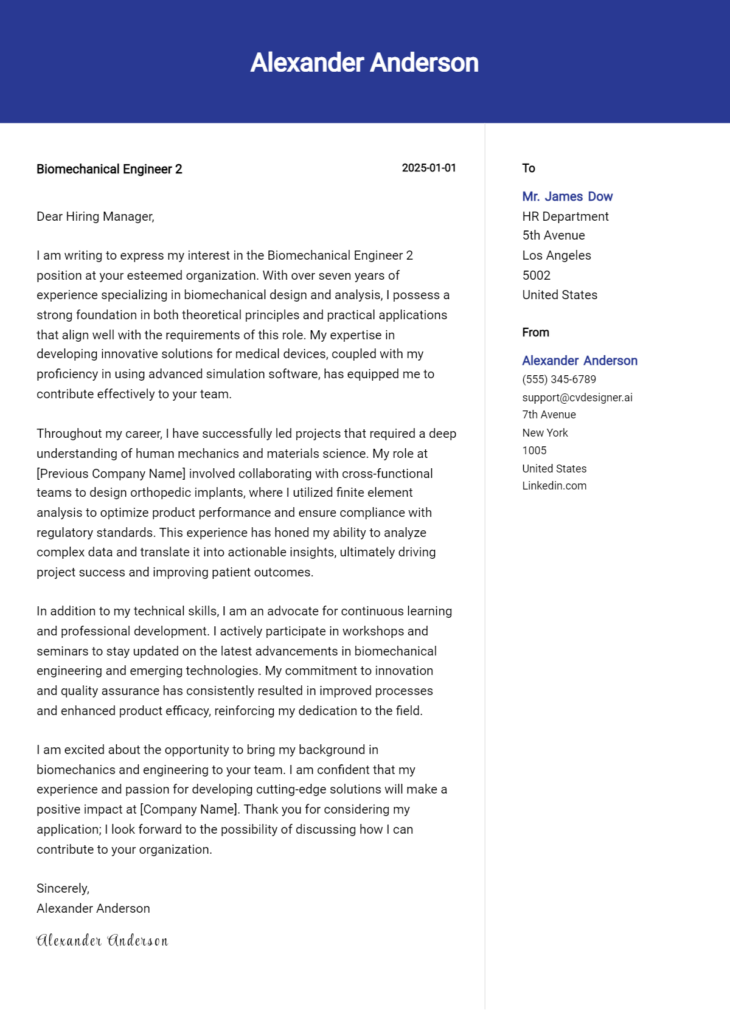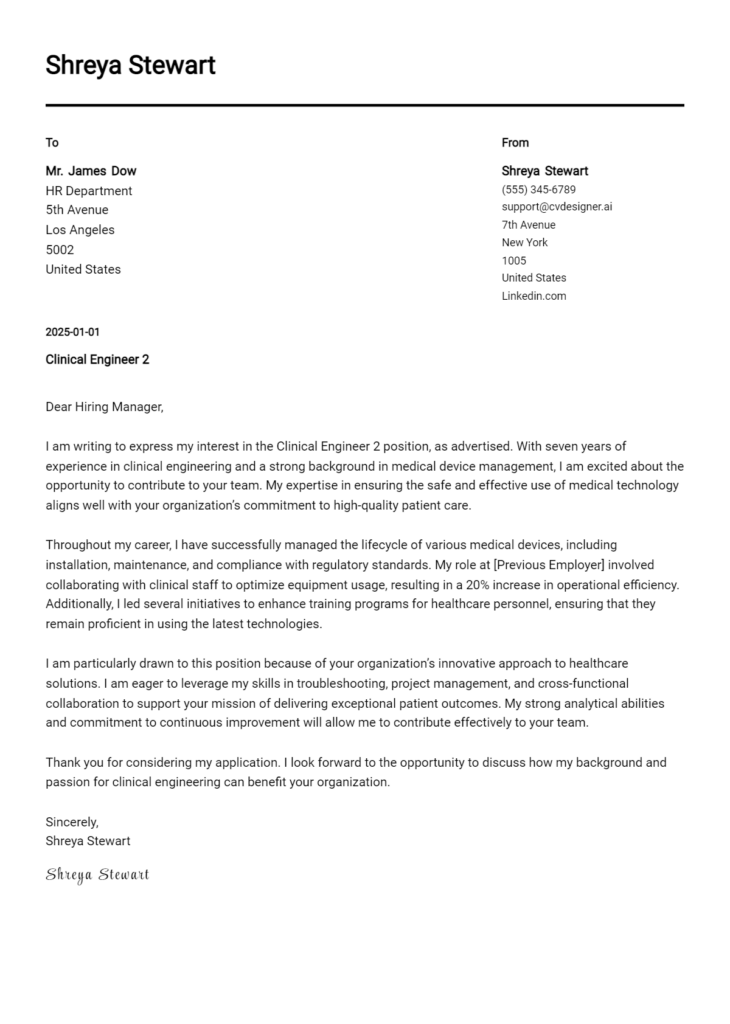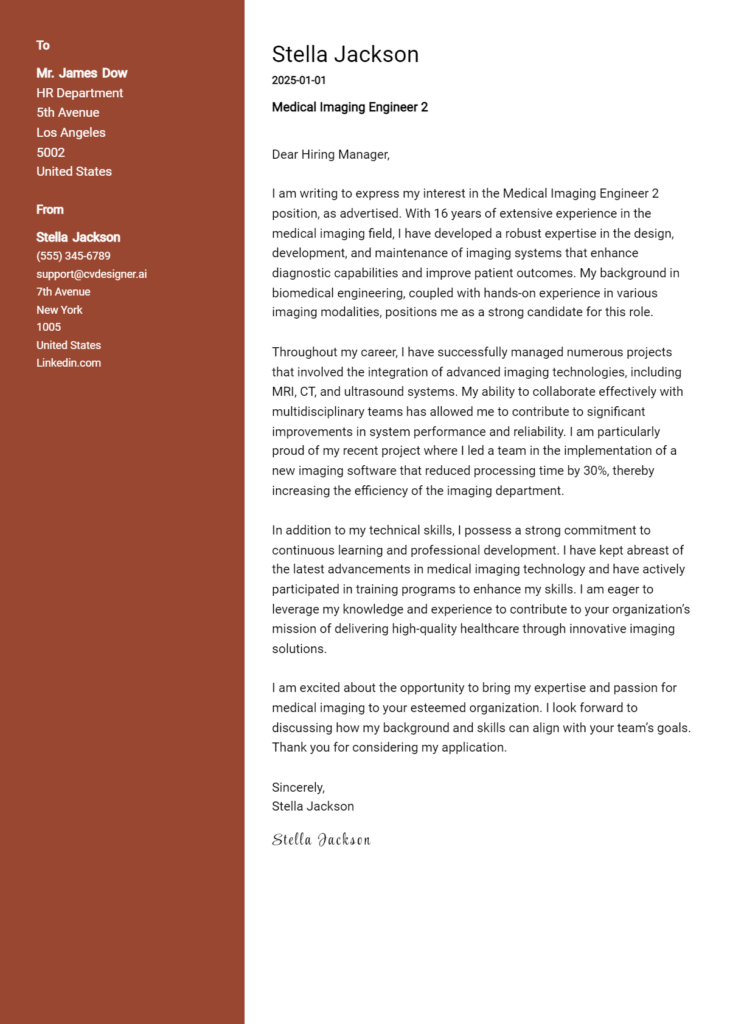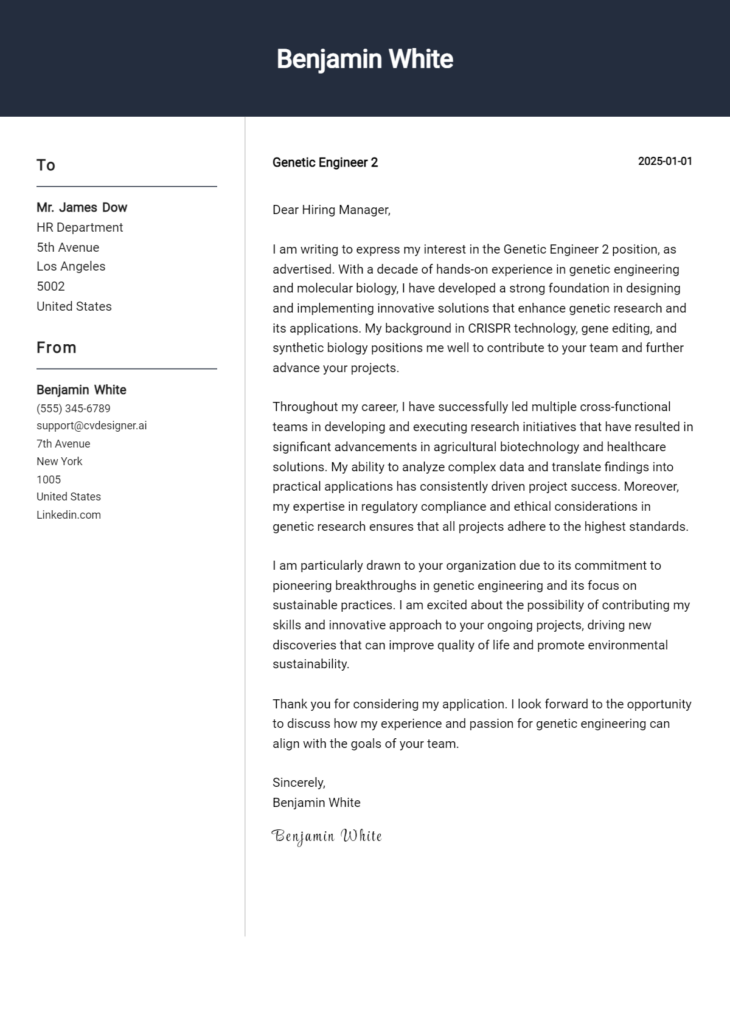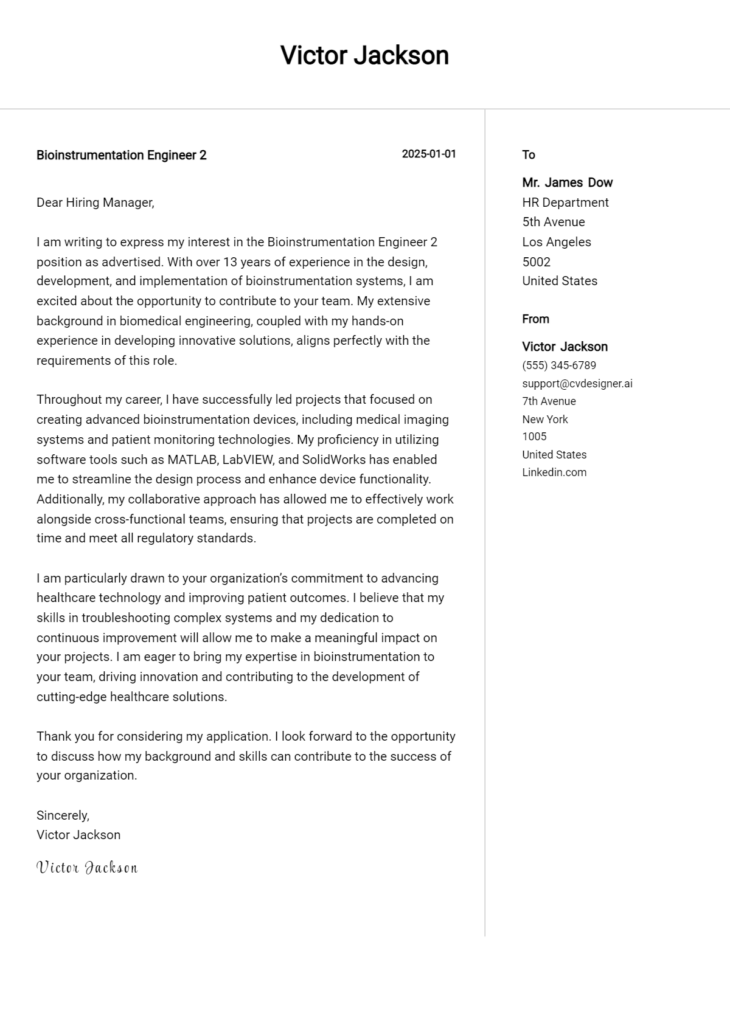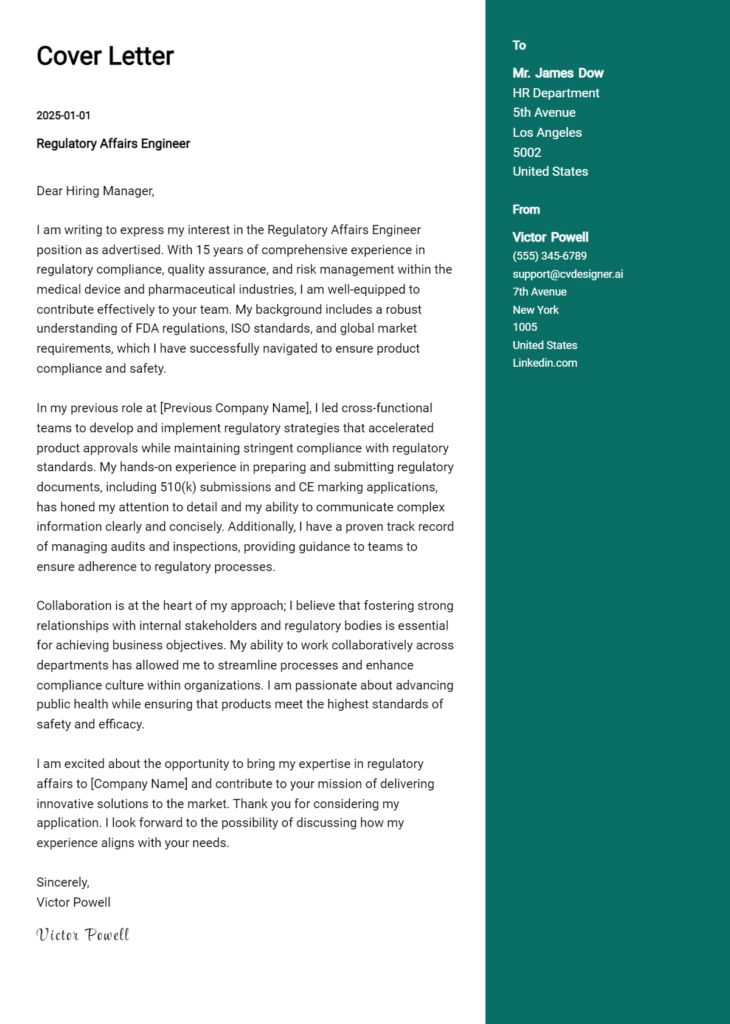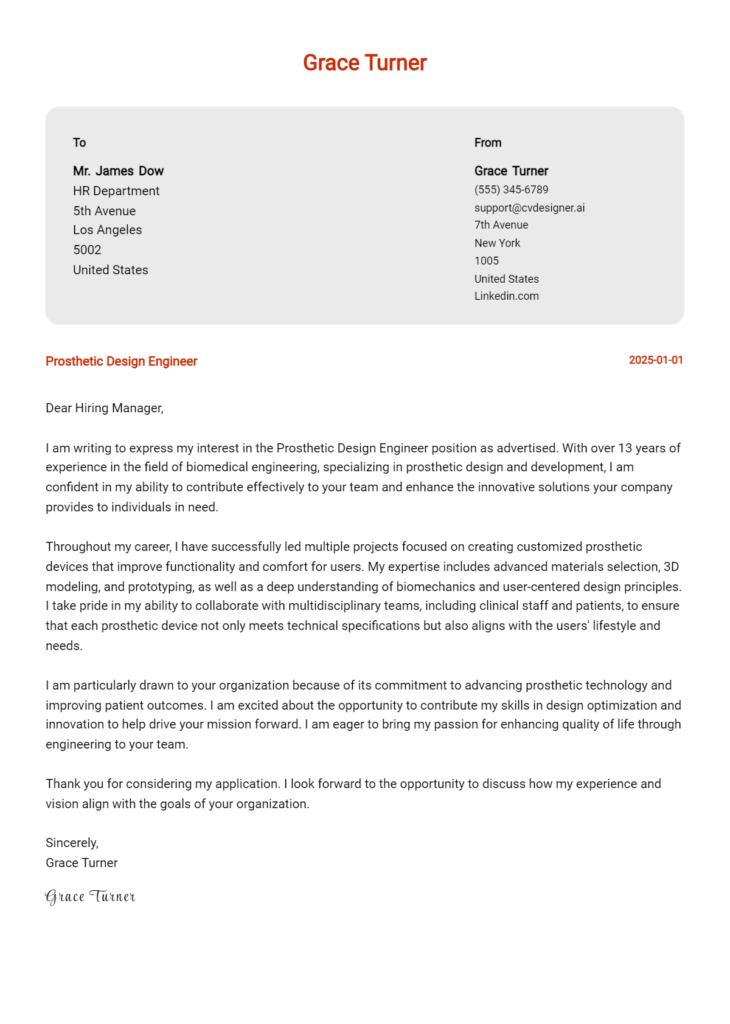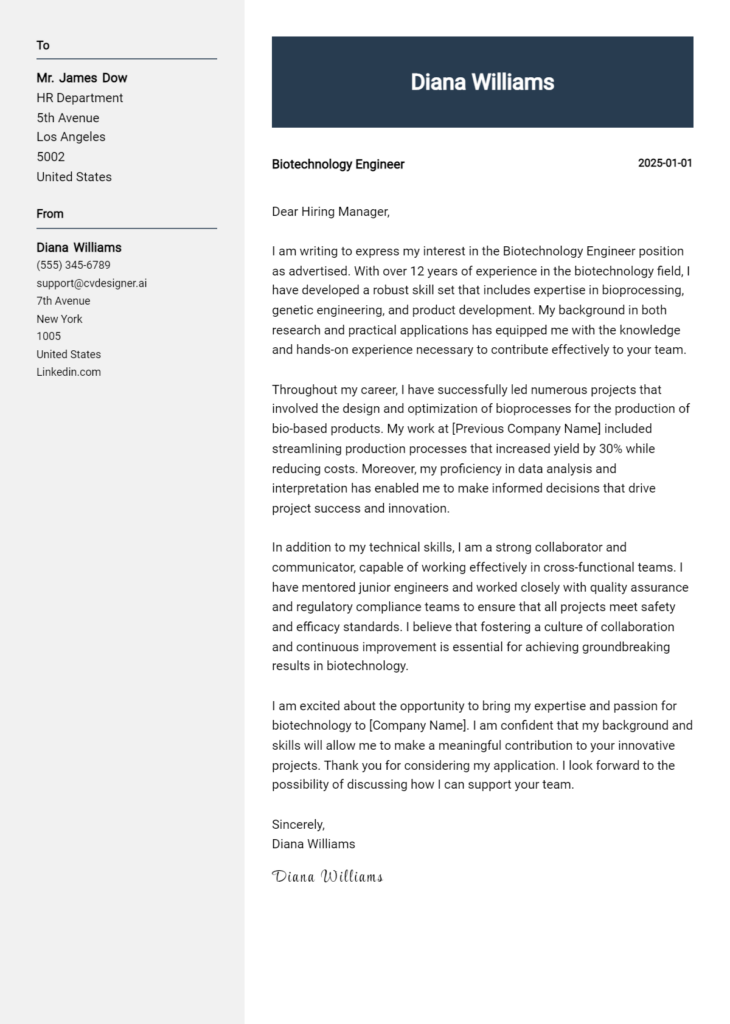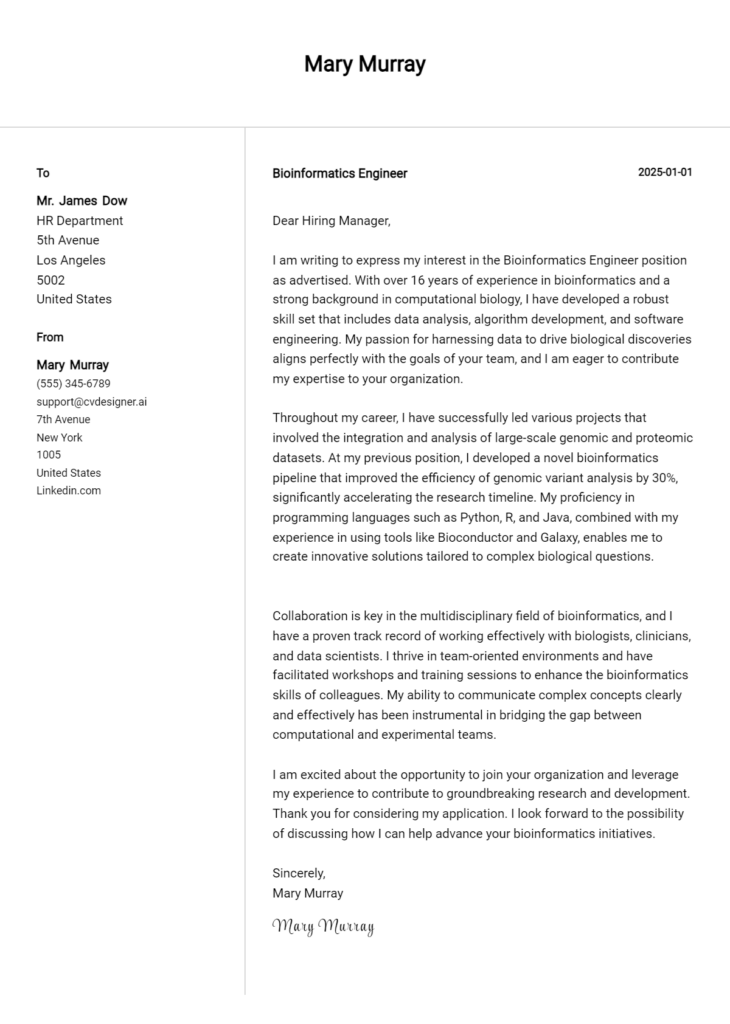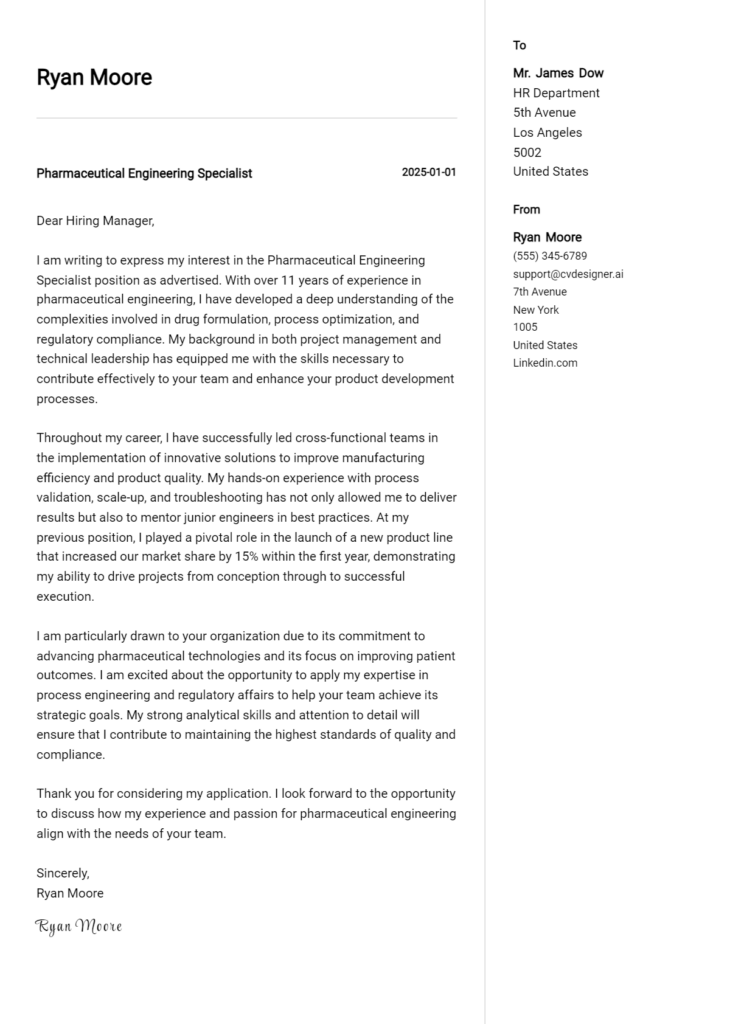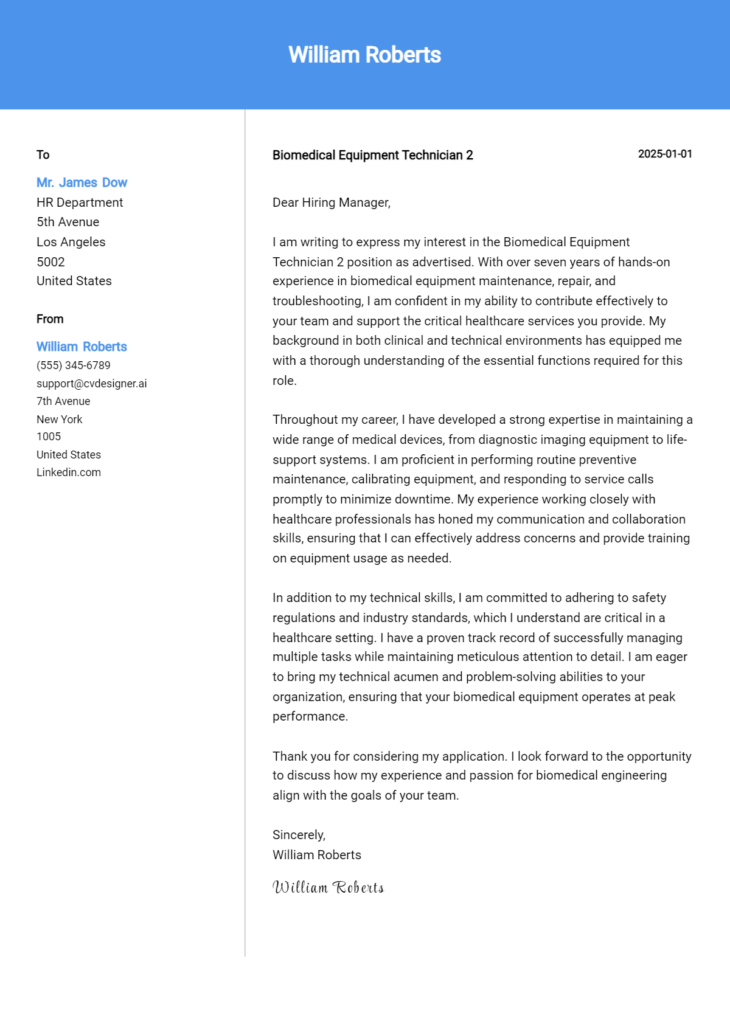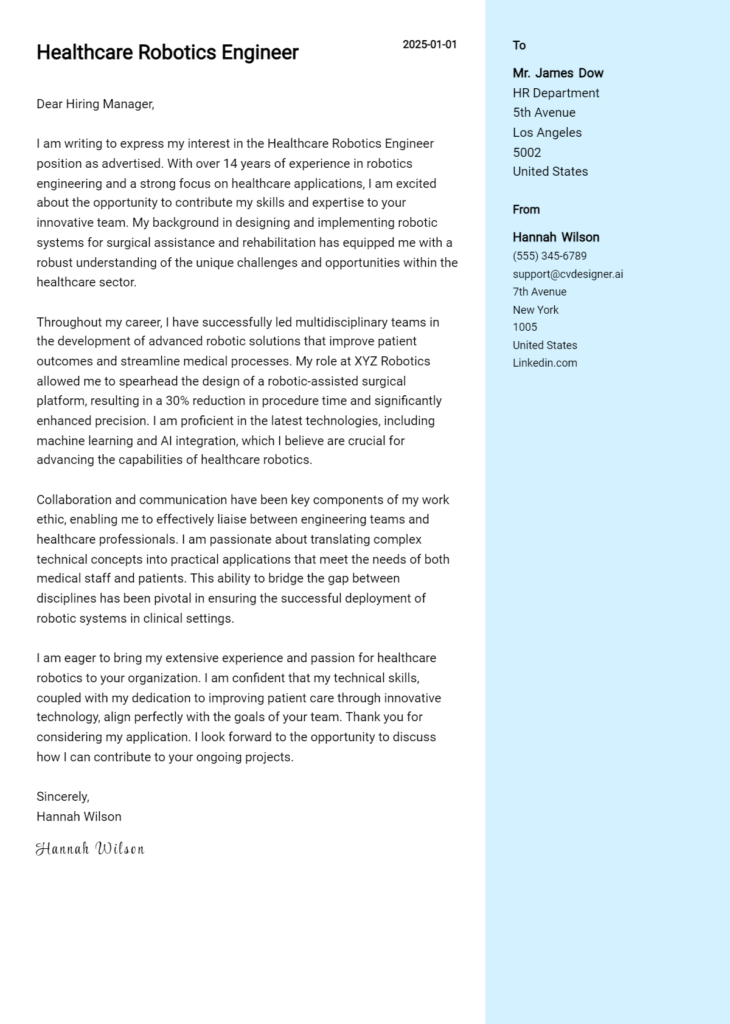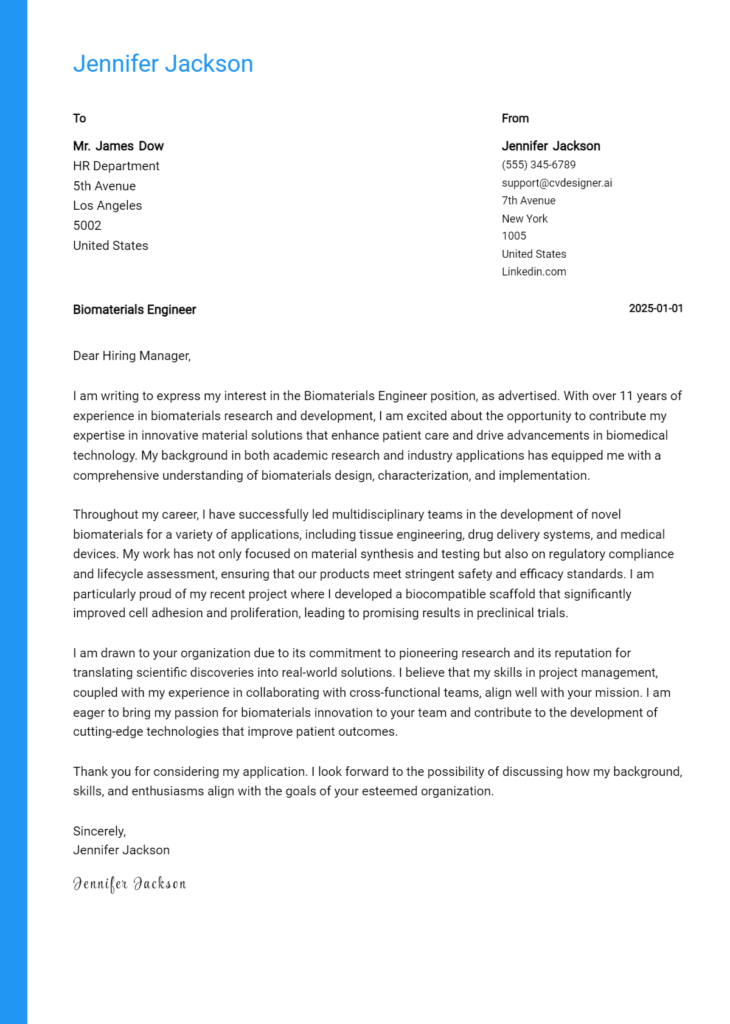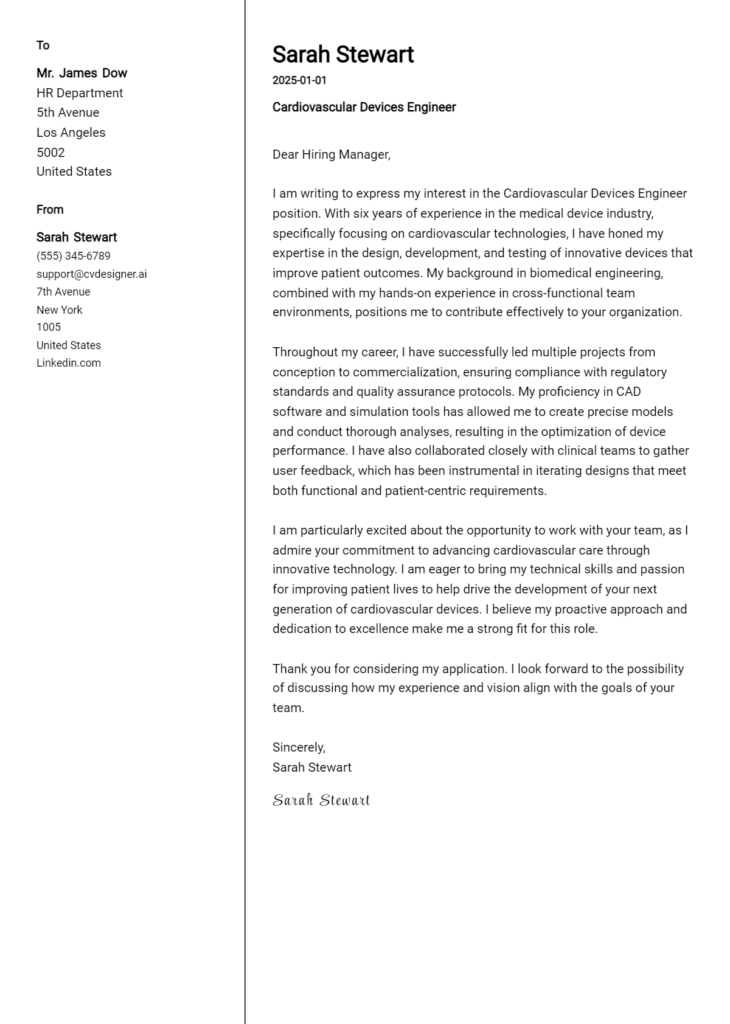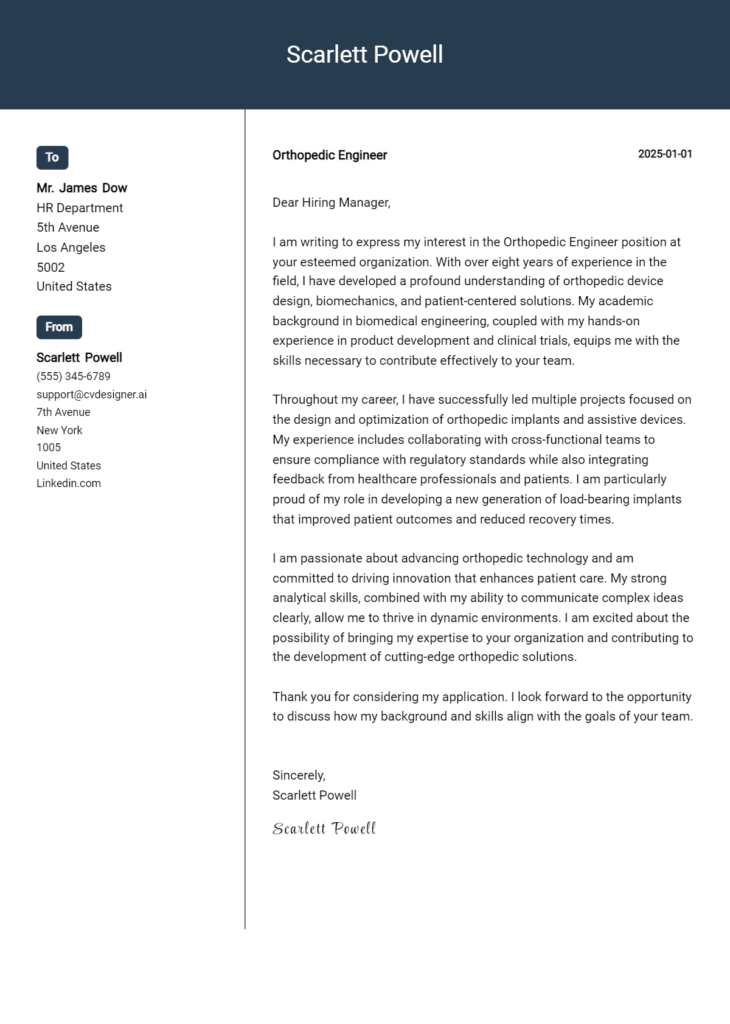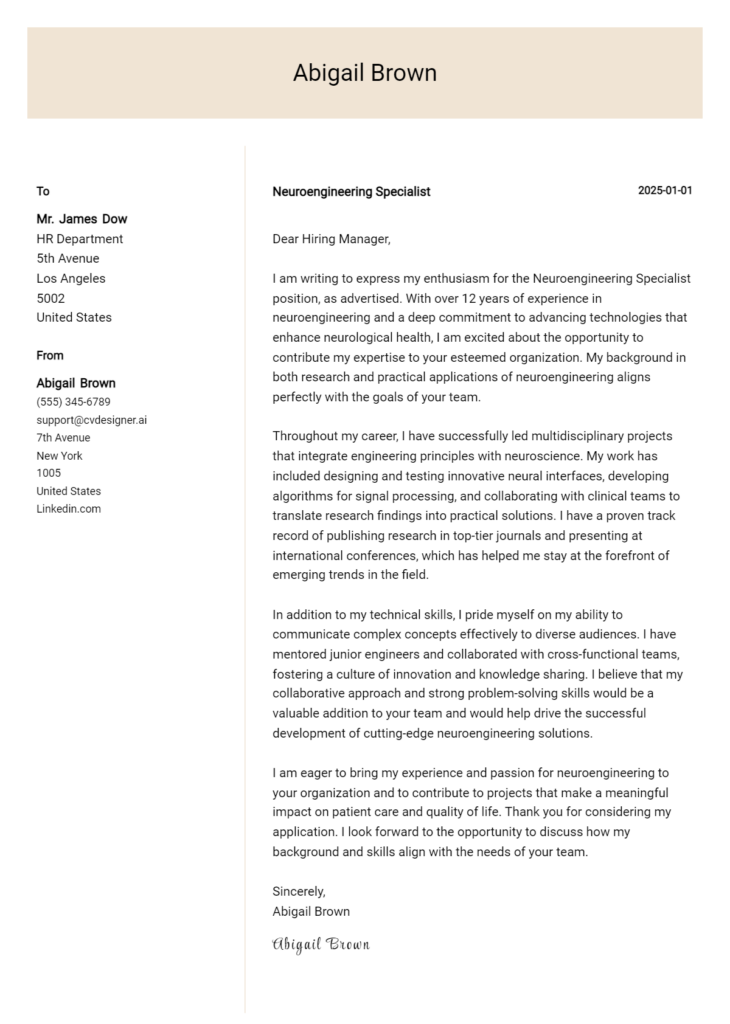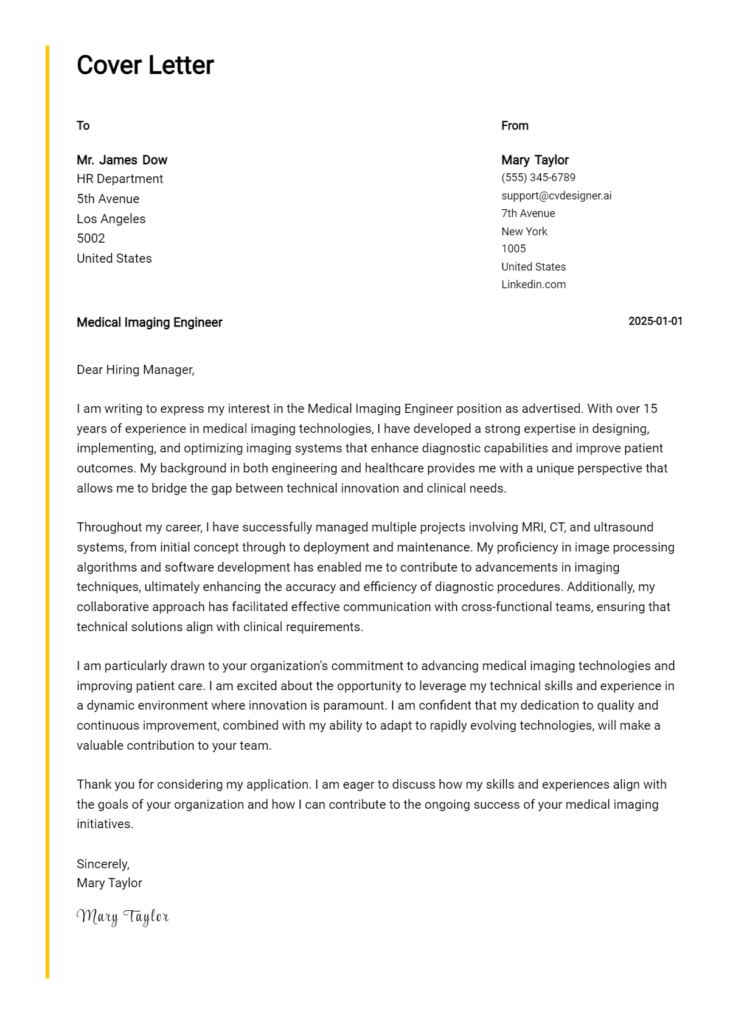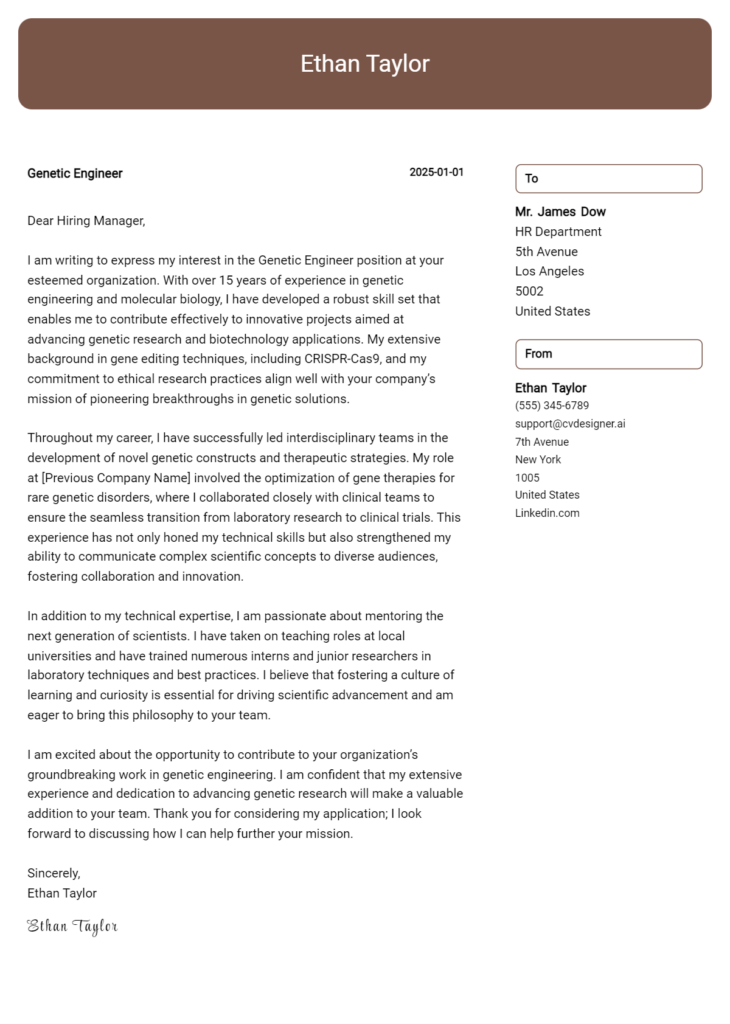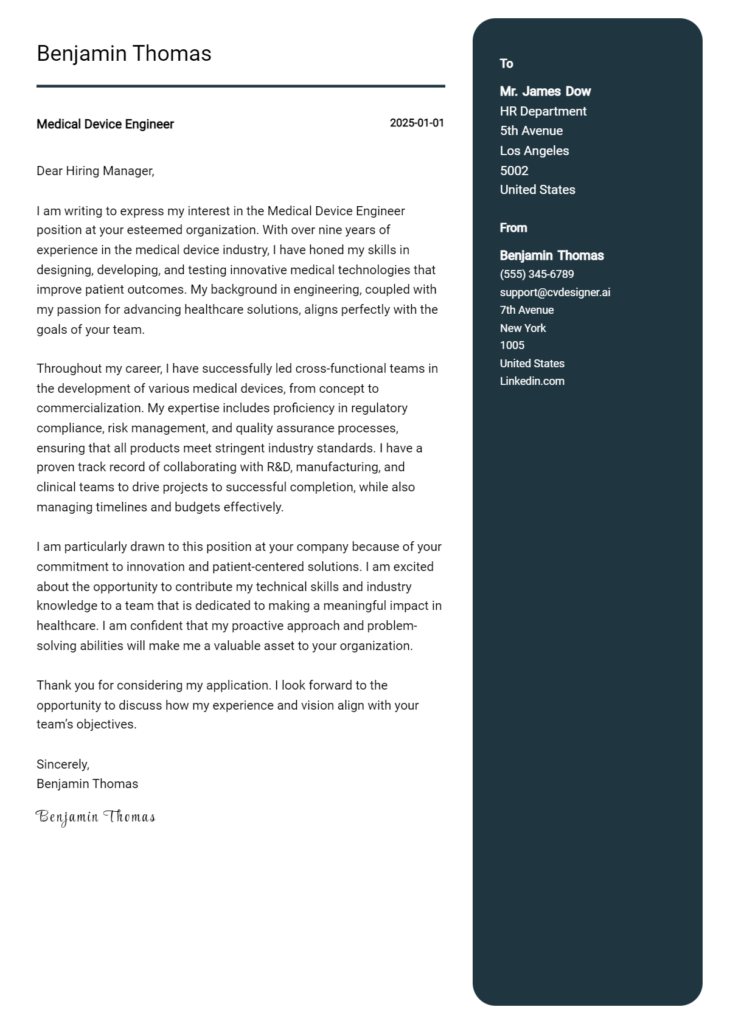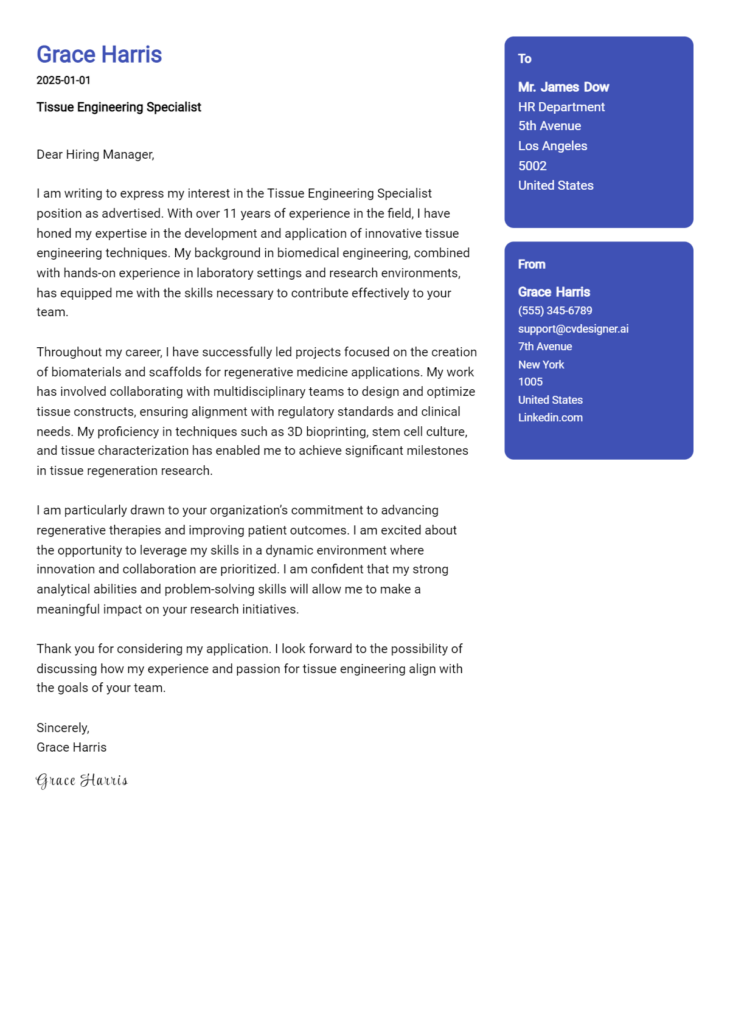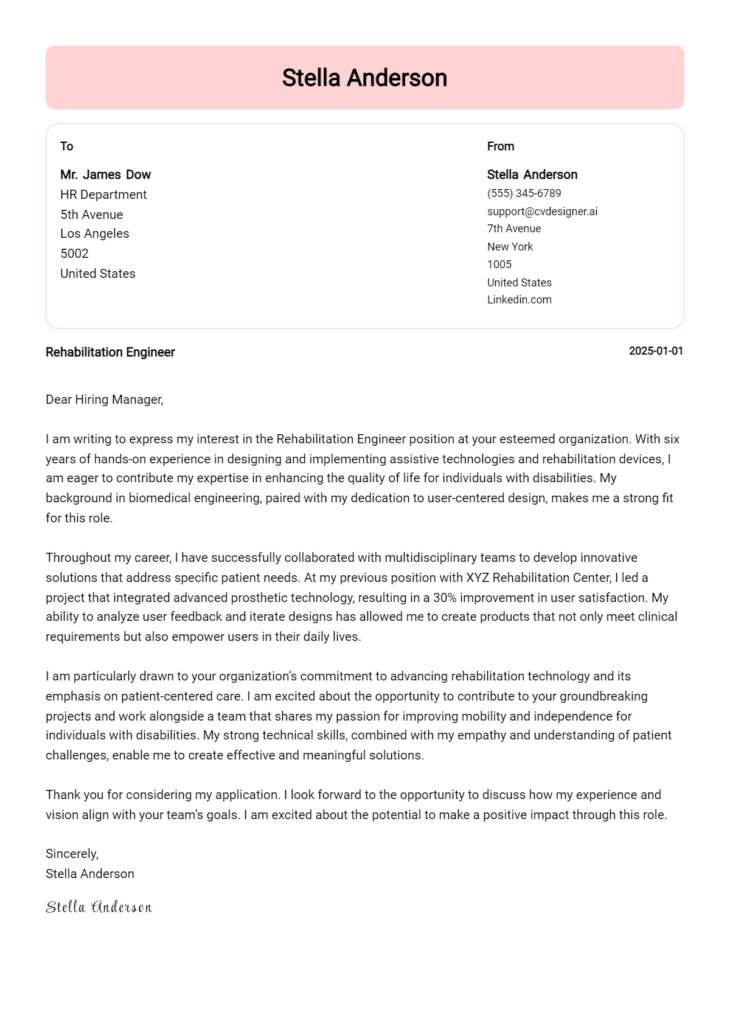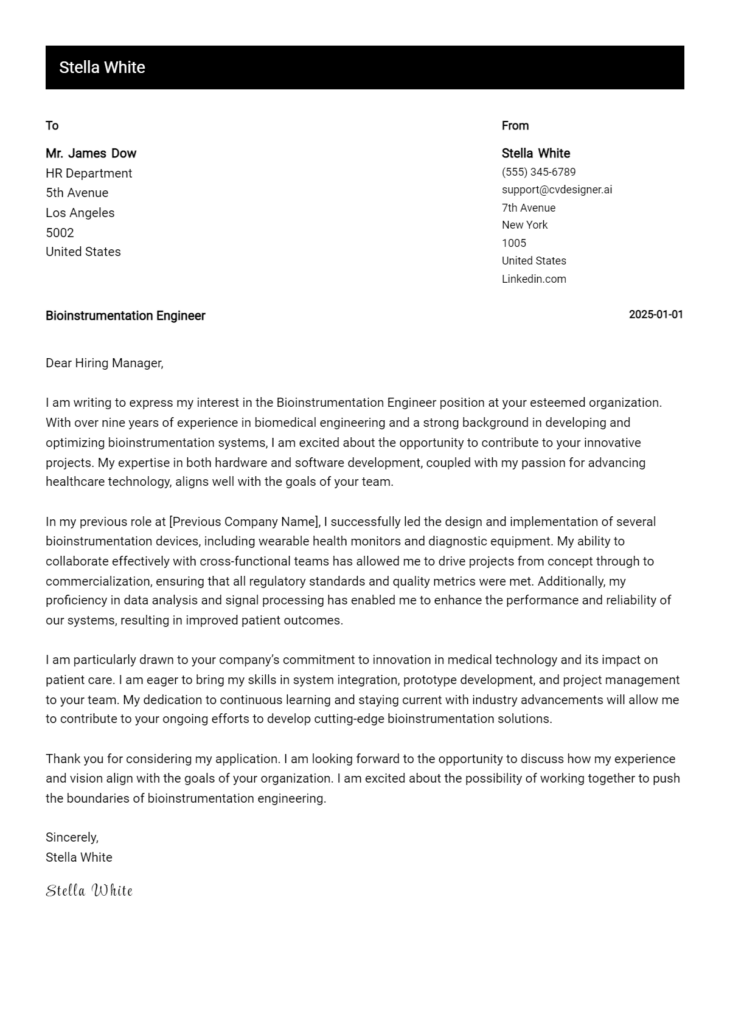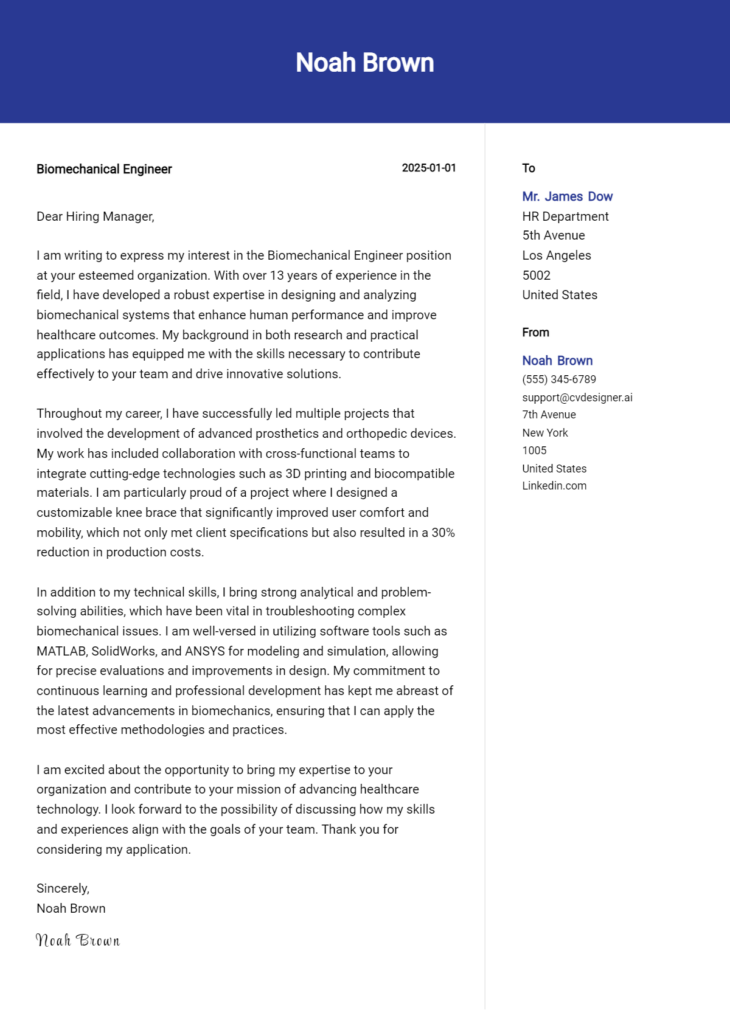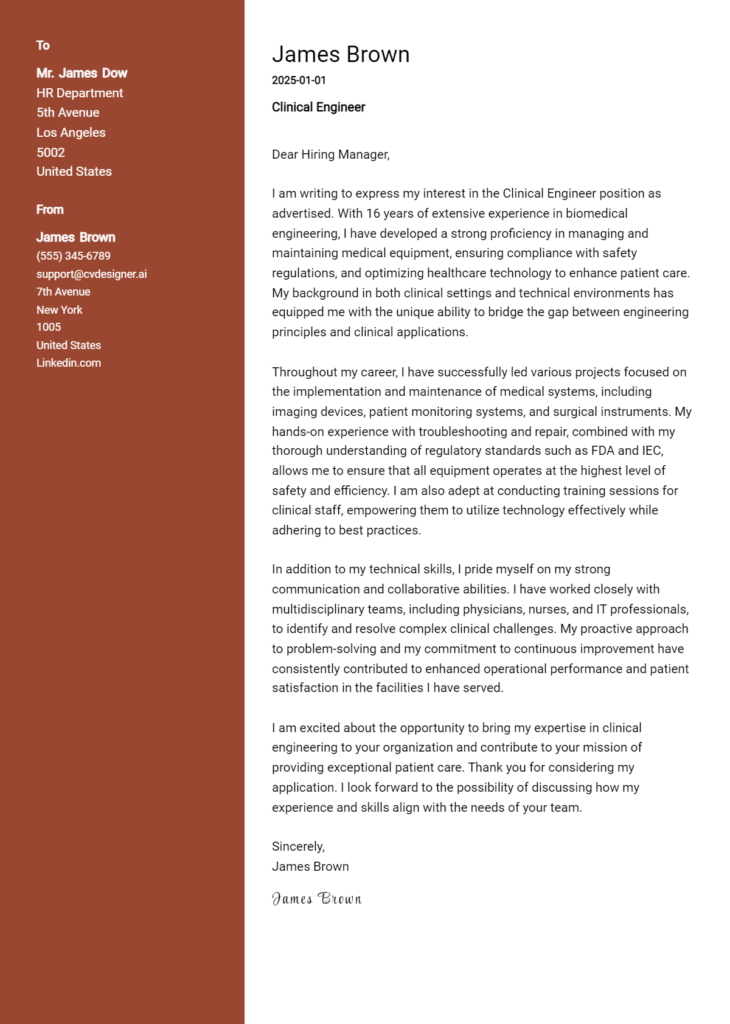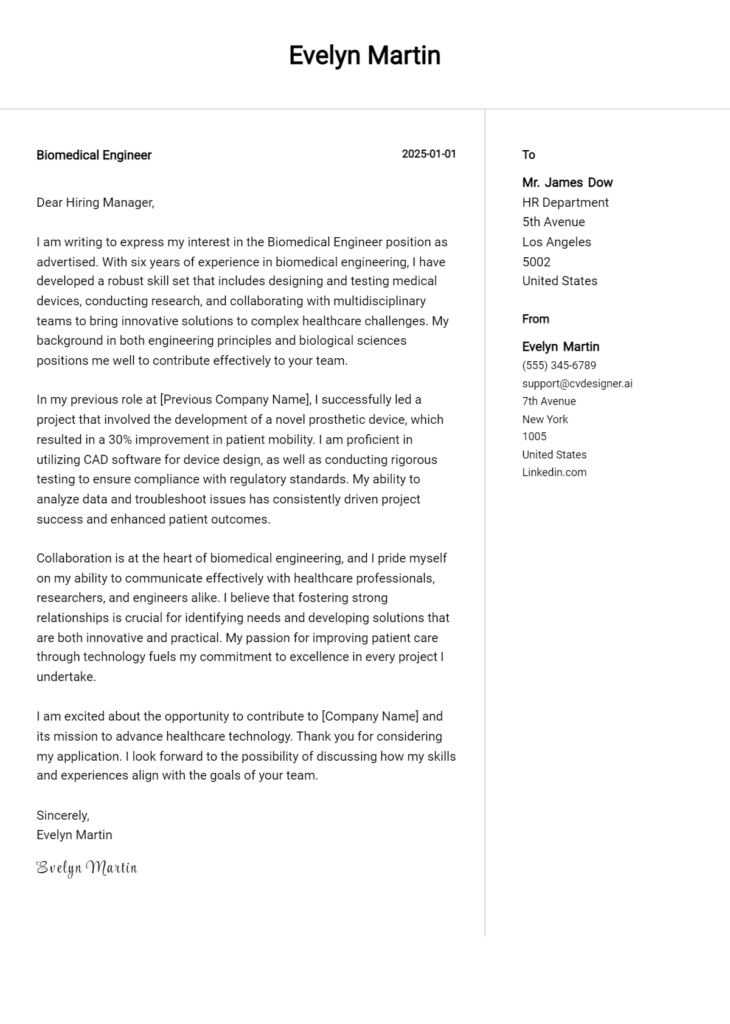Tissue Engineering Specialist 2 Cover Letter Examples
Explore additional Tissue Engineering Specialist 2 cover letter samples and guides and see what works for your level of experience or role.
How to Format a Tissue Engineering Specialist Cover Letter?
Crafting an effective cover letter is essential for a Tissue Engineering Specialist, as it serves as your first opportunity to make a strong impression on potential employers. The formatting of your cover letter not only communicates your qualifications but also reflects your meticulousness and ability to articulate complex scientific concepts clearly. Just as the intricacies of tissue engineering require precision and attention to detail, so too does your cover letter structure. A well-organized document will capture the hiring manager's attention and demonstrate your commitment to professionalism in a competitive field.
In this guide, we'll explore how to structure your cover letter, providing insights and tissue engineering-specific examples to help you create a compelling presentation of your skills.
We will focus on the essential components of a professional cover letter, including:
- Cover Letter Header
- Cover Letter Greeting
- Cover Letter Introduction
- Cover Letter Body
- Cover Letter Closing
Each section plays a crucial role in showcasing your qualifications and dedication. Let’s break down each part to ensure your cover letter stands out in the field of tissue engineering.
The Importance of a Cover Letter Header for a Tissue Engineering Specialist
The cover letter header is a crucial component of your application as a Tissue Engineering Specialist. It provides essential information that establishes your identity and contact details while also presenting a professional image to the recipient. A well-structured header should include your name, address, phone number, and email, followed by the date, and then the recipient's name, title, company, and address. Clarity and professionalism in this section set the tone for the rest of your cover letter, making it easier for potential employers to contact you and ensuring that your application is taken seriously.
Strong Example
Jane Doe 123 Bioengineering Lane Innovation City, ST 12345 (123) 456-7890 jane.doe@email.com October 1, 2023 Dr. John Smith Director of Research Tissue Engineering Institute 456 Science Blvd Research Town, ST 67890
Weak Example
Jane Doe October 1, 2023 To Whom It May Concern Unknown Address
The Importance of a Cover Letter Greeting for a Tissue Engineering Specialist
The greeting of a cover letter is crucial as it sets the tone for the rest of the letter, establishing a level of professionalism and personalization that can make a significant difference in the hiring process. By addressing the hiring manager directly, you demonstrate respect and genuine interest in the position, which can create a positive first impression. Avoiding generic greetings, such as "To Whom It May Concern," shows that you have done your homework and are truly invested in the opportunity. If necessary, take the time to research the recipient's name through the company website or LinkedIn. A tailored greeting not only reflects your attention to detail but also enhances the overall impact of your cover letter.
Strong Greeting Example
Dear Dr. Smith,
Weak Greeting Example
To Whom It May Concern,
The Importance of a Well-Crafted Cover Letter Introduction for a Tissue Engineering Specialist
A compelling cover letter introduction is crucial for a Tissue Engineering Specialist, as it serves as the first impression to the hiring manager. This introduction should not only capture attention but also clearly express the candidate's enthusiasm for the role while briefly highlighting key skills or notable achievements relevant to tissue engineering. A strong introduction sets the tone for the rest of the cover letter and can significantly influence the hiring manager’s perception of the candidate's fit for the position.
Strong Example
Dear [Hiring Manager's Name], I am excited to apply for the Tissue Engineering Specialist position at [Company Name], where my extensive background in biomaterials and regenerative medicine can contribute to groundbreaking advancements in tissue regeneration. With over five years of hands-on experience in developing bioengineered scaffolds and a published paper in [Relevant Journal], I am eager to bring my expertise to your innovative team and help drive transformative solutions in patient care.
Weak Example
Hello, I would like to apply for the job of Tissue Engineering Specialist at your company. I have some experience in the field and think I could be a good fit. I have worked on various projects and am eager to learn more about tissue engineering.
Purpose of the Cover Letter Body for a Tissue Engineering Specialist
The cover letter body for a Tissue Engineering Specialist serves as a critical platform for candidates to articulate their relevant skills, experiences, and the unique value they bring to potential employers. This section should highlight specific projects or accomplishments that demonstrate expertise in tissue engineering and showcase the candidate's ability to contribute effectively to the company's objectives. By detailing past successes, such as the development of innovative biomaterials or successful collaborations in multi-disciplinary teams, the candidate can effectively convey their capacity for problem-solving and innovation in this specialized field.
Strong Example
In my previous role at BioTissue Solutions, I successfully led a project that developed a novel bioprinted scaffold for cartilage regeneration, which resulted in a 30% improvement in cell viability compared to traditional methods. This project not only enhanced our product line but also secured a grant for further research and development. My collaborative work with a team of bioengineers and clinicians exemplified my ability to bridge the gap between engineering principles and medical applications, underscoring my commitment to advancing tissue engineering solutions that have real-world impact.
Weak Example
I have worked in tissue engineering for a while now and have done some projects. I think I would be a good fit for your company because I have experience. I am passionate about tissue engineering and want to help your company grow.
Importance of the Cover Letter Closing for a Tissue Engineering Specialist
The closing of a cover letter is crucial as it serves to summarize your qualifications, reiterate your enthusiasm for the position, and encourage the hiring manager to take the next steps, such as reviewing your resume or scheduling an interview. In the field of tissue engineering, where innovation and collaboration are key, a strong closing can leave a lasting impression that reinforces your fit for the role. A compelling closing can help differentiate you from other candidates by highlighting your unique contributions to the field.
Strong Example
Thank you for considering my application for the Tissue Engineering Specialist position. With my robust background in biomaterials development and a proven track record of successful tissue regeneration projects, I am excited about the opportunity to contribute to your team at [Company Name]. I am eager to bring my expertise in collaborative research and innovative solutions to the forefront of your projects. I look forward to discussing how I can support your initiatives in advancing tissue engineering. Please feel free to contact me to schedule an interview at your earliest convenience.
Weak Example
I hope you like my application. I think I would be okay for the Tissue Engineering Specialist job. I have some experience and would like to talk more about the position if you want. Please check my resume.
These tips will help candidates craft an effective cover letter for a Tissue Engineering Specialist position. In this competitive field, it is crucial to showcase not only your technical skills and problem-solving abilities but also your knowledge of the software development life cycle (SDLC), teamwork experience, and a genuine passion for continuous learning. By focusing on these key areas, you can create a compelling cover letter that stands out to potential employers.
Tips for Writing a Cover Letter as a Tissue Engineering Specialist
Highlight Technical Skills
Clearly articulate your expertise in relevant technologies and methodologies, such as biomaterials, cell culture techniques, and 3D bioprinting. Use specific examples from previous projects to demonstrate how these skills contributed to successful outcomes. This not only shows your proficiency but also your hands-on experience in tissue engineering.Showcase Problem-Solving Abilities
Discuss specific challenges you have encountered in your previous roles and the innovative solutions you implemented. Emphasize your analytical skills and ability to troubleshoot complex issues in laboratory settings. Remember to quantify your achievements where possible to illustrate the impact of your problem-solving efforts.Demonstrate Knowledge of SDLC
If applicable, mention your familiarity with the software development life cycle and how it relates to tissue engineering. Detail any experience you have in developing or using software tools that streamline research processes or data management. This knowledge can be a significant asset in interdisciplinary teams where engineering and software development intersect.Emphasize Teamwork and Collaboration
Tissue engineering often requires collaboration across various disciplines. Include examples of successful teamwork from your past experiences, highlighting your role in fostering a cooperative environment. Discuss your ability to communicate effectively with colleagues from diverse backgrounds, which is essential for driving projects forward.Express Passion for Continuous Learning
The field of tissue engineering is always evolving. Convey your commitment to staying current with the latest research, technologies, and methodologies. Mention any relevant courses, certifications, or conferences you have attended. This illustrates your proactive approach to professional development and your enthusiasm for contributing to advancements in the field.
By incorporating these elements into your cover letter, you can effectively convey your qualifications and enthusiasm for the Tissue Engineering Specialist role. For additional assistance, consider exploring cover letter templates or using a cover letter builder to streamline the process.
Common Mistakes to Avoid in a Tissue Engineering Specialist Cover Letter
Avoiding common mistakes in a cover letter is crucial for standing out in the competitive field of tissue engineering. A well-crafted cover letter can significantly increase your chances of landing an interview. Here are some frequent pitfalls to watch out for:
Generic Language: Using a one-size-fits-all template can make your letter feel impersonal. Tailor your cover letter to the specific role and company by mentioning relevant projects or values.
Neglecting Formatting: A cluttered or unprofessional format can distract from your qualifications. Follow a clear cover letter format to ensure readability and professionalism.
Lack of Specificity: Failing to include specific examples of your achievements can weaken your application. Highlight particular projects or skills that align with the job description.
Overloading with Technical Jargon: While expertise is important, using too much technical terminology can alienate the reader. Strike a balance by explaining complex concepts in an accessible manner.
Ignoring the Company Culture: Not showing an understanding of the company’s culture can be a red flag. Research the company and reflect its values in your cover letter.
Typos and Errors: Mistakes can undermine your credibility. Always proofread your letter and consider using tools or a second pair of eyes for review.
Failing to Follow Up: Not expressing interest in following up can make you seem disengaged. Include a sentence about your eagerness to discuss your application further.
By steering clear of these common mistakes and focusing on crafting a personalized, well-structured letter that showcases your unique qualifications, you can greatly enhance your chances of success. For more insights, check out these cover letter examples.
Cover Letter FAQs for Tissue Engineering Specialist
How should I start my cover letter for a Tissue Engineering Specialist position?
Begin your cover letter with a strong opening that captures the reader's attention. Start with a professional greeting, addressing the hiring manager by name if possible. Follow this with a compelling introduction that highlights your passion for tissue engineering and your relevant qualifications. For example, you might mention your degree in biomedical engineering and your hands-on experience in tissue culture or scaffold design. Express enthusiasm for the specific role and the organization, showing that you understand their mission and how your background aligns with their goals. A personalized opening sets a positive tone and engages the reader right from the start.
What key skills should I highlight in my cover letter?
In your cover letter, emphasize skills that are directly relevant to tissue engineering, such as expertise in biomaterials, cellular biology, and 3D bioprinting. Additionally, highlight your laboratory skills, including experience with tissue culture techniques and analytical methods. Problem-solving and critical thinking abilities are crucial in this field, so mention instances where you successfully addressed challenges in past projects. It’s also beneficial to showcase teamwork and communication skills, as collaboration is essential in research environments. Tailoring your skills to match the job description will demonstrate your suitability for the position.
How long should my cover letter be?
A cover letter for a Tissue Engineering Specialist position should be concise and focused, ideally one page long. Aim for three to four paragraphs that clearly articulate your qualifications and enthusiasm for the role. Start with a brief introduction, followed by a paragraph detailing your relevant experiences and skills, and then conclude with a strong closing statement. Avoid excessive detail or repetition; instead, focus on delivering impactful information that showcases your strengths and aligns with the job requirements. A well-structured, succinct cover letter will leave a lasting impression on hiring managers.
Should I include specific examples of my work in tissue engineering?
Yes, including specific examples of your work in tissue engineering is highly beneficial. Use concrete examples to illustrate your achievements and how they relate to the position you are applying for. For instance, you could describe a project where you developed a novel scaffold for tissue regeneration, the methodologies used, and any notable results or publications that emerged from your work. Quantifiable outcomes, such as improved cell viability or successful integration in animal models, can significantly enhance your application. Specific examples not only demonstrate your expertise but also provide tangible evidence of your contributions to the field.
Build your Cover Letter in minutes
Use an AI-powered cover letter builder and have your letter done in 5 minutes. Just select your template and our software will guide you through the process.

